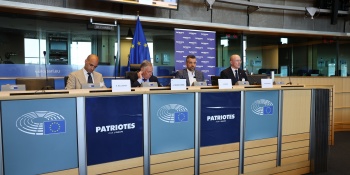Published: 24.11.2021

· The European Union intends to sign a new partnership agreement with the Organisation of African, Caribbean and Pacific States (OACPS).
· The agreement is intended to bring together a majority of members of the UN General Assembly and to regulate the adoption of unified positions on matters falling within the scope of the agreement.
· The creation of such a bloc may enable the adoption of ideological demands at the UN in the form of provisions which are also binding for Poland.
· The signing of the agreement is opposed by a coalition of non-governmental organisations from Europe and the USA.
· On the website stopideologicalneocolonialism.org, one can sign an appeal to reject the agreement.
In addition to EU Member States, the OACPS-EU partnership also includes 79 countries in Africa, the Caribbean and the Pacific. This makes a total of 106 countries, which represents an absolute majority in the UN General Assembly. Currently, relations between the Union and the OACPS are governed by the Cotonou Agreement which focusses on economic issues. The new agreement is to be in force for a period of 20 years and will intervene in cultural, legal and health areas.
The implementation of the agreement will mean that the signatories accept ideological demands that are contrary to the legal order of many countries. Even its preamble mentions the need to recognise ‘gender identity’ as a factor essential to achieving inclusive and sustainable development. The agreement also requires the systematic promotion of the gender perspective and the implementation of ‘gender equality’ at all levels of state and EU policy and its inclusion in national constitutions. The term appears in only one international instrument, the Istanbul Convention, which has not yet been adopted by 13 states of the Council of Europe. The agreement also implies the adoption of a narrative that takes into account the existence of an alleged ‘deep-rooted gender bias’.
In addition, the agreement includes a commitment to promote ‘concepts of reproductive and sexual rights’ and ‘family planning’. However, no definitions of these concepts are given in the document, which creates wide room for interpretation. Moreover, under the term ‘reproductive and sexual rights’, there is usually a postulate to promote abortion.
The Ordo Iuris Institute, together with NGOs from the USA, Italy, the Netherlands and Tanzania, prepared a statement with an appeal to reject the agreement. The appeal can be signed at stopideologicalneocolonialism.org.
‘This agreement, although it is not talked about much, is an important part of the international legal order. The agreement attempts to sneak in many controversial, radical terms, such as sexual and reproductive rights and the obligation to promote a gender perspective. These concepts are challenged on the grounds that they contradict fundamental biological concepts, not only by African, Caribbean and Pacific countries, but also by a large part of Europe’, stressed Patryk Miernowski, an analyst at the Ordo Iuris International Law Centre.

Wednesday's presentation in Brussels of the European Union reform plan developed by Poland’s Ordo Iuris Institute and Hungary’s Mathias Corvinus Collegium garnered significant interest. Nearly a hundred MEPs and their staff from many countries came to the presentation of this proposal.

• Amendments to the directive on the rights of victims of crime are currently under consideration in the European Parliament.

The candidate supported last Sunday by all the Right for the second round of the Polish presidential election had promised that he would veto any law that liberalizes abortion. He won with 50.89% of the votes against the left-liberal candidate who had promised to ratify any law liberalizing abortion.

• The pressure on the European Union’s southern borders has continued unabated since the great migration crisis of 2015.